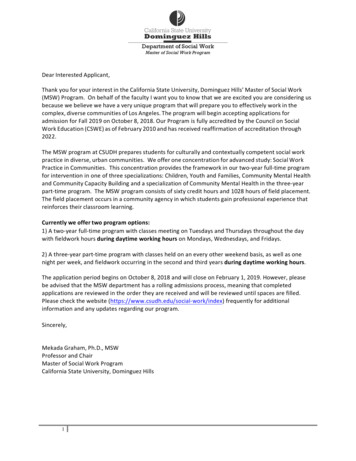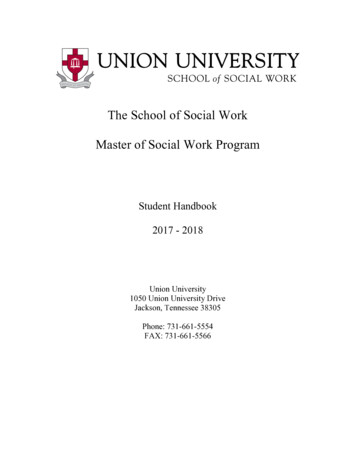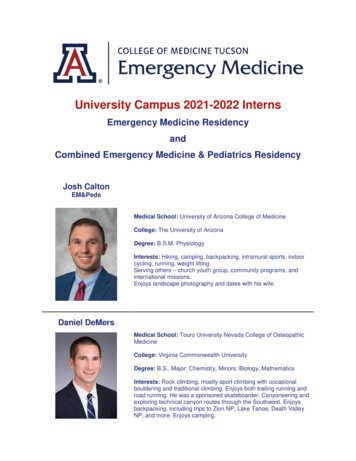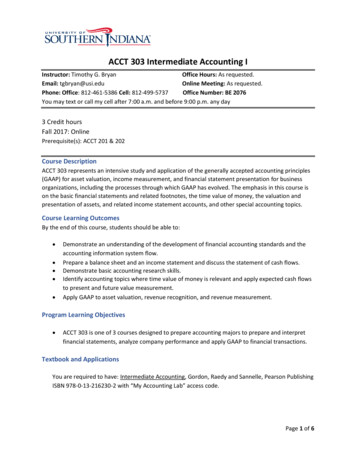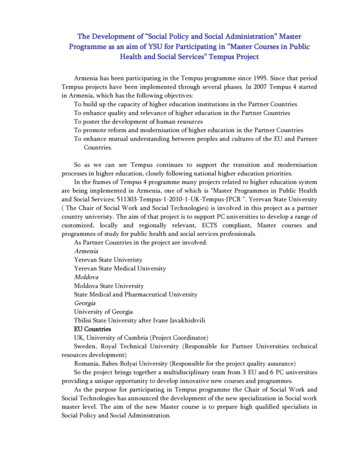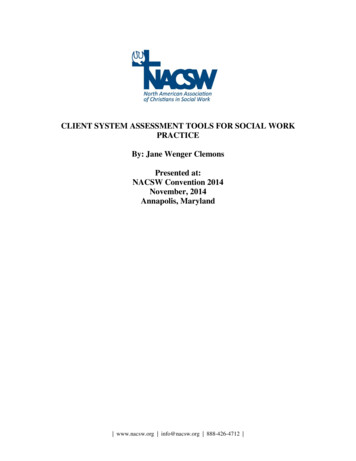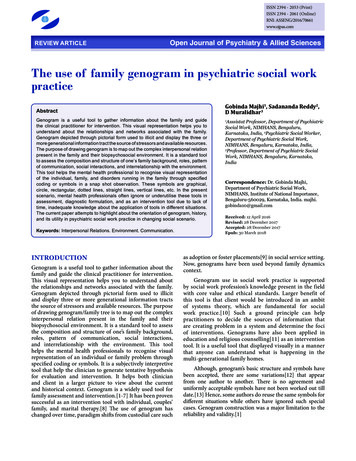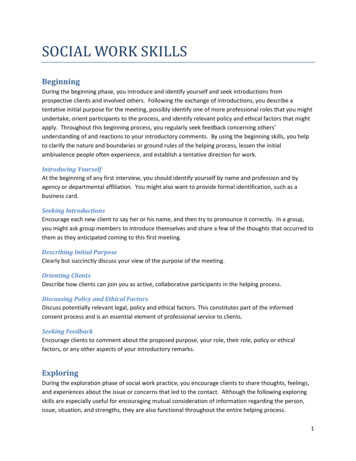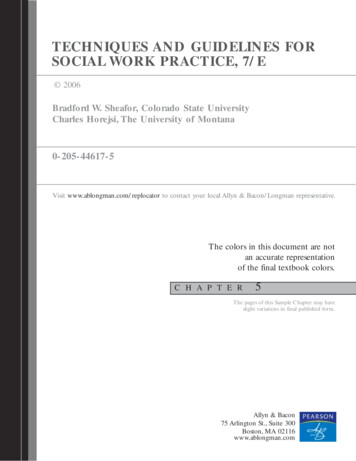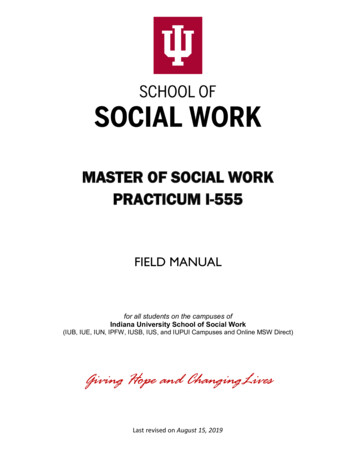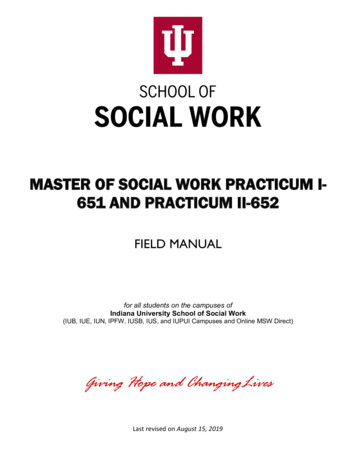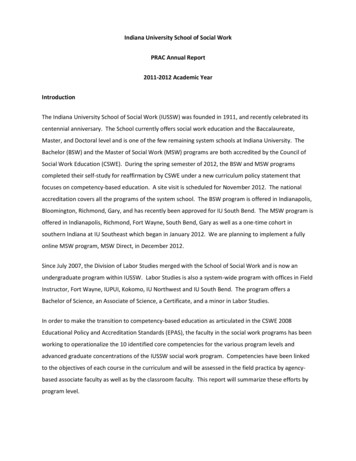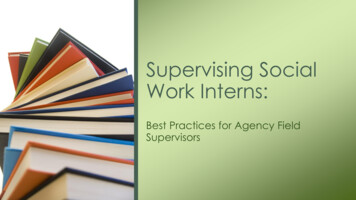
Transcription
Supervising SocialWork Interns:Best Practices for Agency FieldSupervisors
Bonnie Rinks, LCSW, ACSWDirector of Field Education– berinks@usi.edu Jara Dillingham, LCSWProfessor and Field Liaison– jdillingh@usi.edu
Agenda/Topics to Be Covered Mission of Field Education Who’s Who Why are we doing this? Core Competencies– Council on Social WorkEducation 2015 Competenciesand Practice Behaviors– Learning Plans Orientation and Supervision– Field Handbook– Student roles– Supervisor roles– Task supervisor– When Problems arise– Gatekeeping– Turning Students intoProfessionals
The Mission of Field Education In field, the focus turns from the acquisition ofknowledge to the application of knowledge. Students are provided with opportunities to apply thesocial work knowledge and skills obtained in theclassroom to actual practice situations. When a student completes field he/she should beready to enter the profession.
Who’s Who?Agency FieldSupervisor&BSW & MSWStudentsTask instructorAgencyinternField Liaison/SeminarInstructorUniversity Faculty
Why are we doing this?CSWE has new Competencies!
Demands of Agency Supervisors Munson(2002) indicates that fewsupervisors are JUST supervisors. Ratherthey balance the demands ofagencies, clients and requirements ofthe field with the needs of students orsupervisees.
Eliminate Stress We hope this training helpsclarify expectations, andeliminate some of the stressassociated with fieldeducation.
Learn to be Social Workers Help themlearn to beSocial Workers!Not just do aparticular jobor work in aparticularagency. This involvescreatinglearningopportunitiesfor students tointegratetheory andpractice.
The Agency Field Supervisors assist students in applying thecore competencies, social work knowledge, values, and skillsthey have learned in class to an agency (or practice) setting
Council on Social Work Education2015 Core Competencies
2015 CSWE – Field Education “ Signature pedagogies are elements of instruction and ofsocialization that teach future practitioners thefundamental dimensions of professional work in theirdiscipline – to think, to preform, and to act ethically andwith integrity . The intent of field education is to integrate the theoreticaland conceptual contribution of the classroom with thepractical world of the practice setting . Field Education is designed, supervised, coordinated andevaluated based on criteria which students demonstratethe Social Work Core Competencies.”
2015 Core Competencies of Social WorkEducation Competency 1: DemonstrateEthical and Professional Behavior Competency 2: Engage Diversityand Difference in Practice Competency 3: Advance HumanRights and Social, Economic, andEnvironmental Justice Competency 4: Engage In Practiceinformed Research and Researchinformed Practice Competency 5: Engage in PolicyPractice Competency 6: Engage withIndividuals, Families, Groups,Organizations, and Communities Competency 7: Assess Individuals,Families, Groups, Organizations,and Communities Competency 8: Intervene withIndividuals, Families, Groups,Organizations, and Communities Competency 9: Evaluate Practicewith Individuals, Families, Groups,Organizations, and CommunitiesCSWE 2015 Core Competencies (page 7-9)
2015 Core Competencies with integratedbehaviors (examples)2) Engage Diversity and Difference in Practice apply and communicate understanding of the importance of diversity and differencein shaping life experiences in practice at the micro, mezzo, and macro levels; present themselves as learners and engage clients and constituencies as experts oftheir own experiences; apply self-awareness and self-regulation to manage the influence of personal biasesand values in working with diverse clients and constituencies.5) Engage in Policy Practice Identify social policy at the local, state, and federal level that impacts well-being,service delivery, and access to social services; assess how social welfare and economic policies impact the delivery of and access tosocial services; apply critical thinking to analyze, formulate, and advocate for policies that advancehuman rights and social, economic, and environmental justice
Student Learning Plan (SLP) example How is thestudent going todemonstratethey havemastered thecompetenciesof ourprofession?# 5 Engage in Policy Practice Identify social policy at the local, state, andfederal level that impacts well-being, servicedelivery, and access to social services;The student has to identify how they are goingto meet this competency while in the agencystudents will write specific activities for eachpractice behavior
How to Grade Interns1Unacceptable2DevelopingRUBRICThe intern hasThe intern hasnot met thenot as yet metexpectations intheir learningthis area, and plan expectationsappearsin this area, butunmotivated toappearsmake changesmotivated tothat would meet continue to focustheir learningand likely willplanmeet theexpectations inexpectationsthe near futurewithin thetimeframe of AThe intern hasThe intern isThe intern hasNotmet theirfunctioning above excelled in this applicable,learning plan their learning plan area above &as theexpectations inexpectations inbeyond anyopportunitythis areathis areaexpectations oftoa beginning- demonstratelevel socialcompetenceworkerin this areawas notavailable
Grades Your intern is learning to apply the knowledge and skills he/sheacquired in the classroom, therefore we expect to see 2’s & 3’s. It is simply a Snapshot of where the intern is, at the time ofevaluation. A “5” does not mean an “A” A 5 would mean that the intern is ready to be one ofyour co-workers without any additional instruction orpractice.
Grades The Faculty Field Liaison has the responsibility of assigning thegrade for the course. The grade that is assigned will be basedon:– intern logs– ethical and professional behavior– Synthesizing course work and practice (seminar participation,assigned papers, as well as other assignments)– the faculty supervisor’s overall evaluation of the student’sperformance in placement in conjunction with the AgencyField Supervisor’s evaluation (your input is valuable anddesired)
Generalist: BSW I & II and MSW I Generalist practice is broadlydefined. This foundation field placement isdesigned so that students candemonstrate the CoreCompetencies at the generalist levelof social work practice. Social work roles typical of generalistpractice include: case manager,advocate, broker, educator,community organizer, group workerand individual counselor. Assigned tasks often includepreparing psychosocial histories,developing service plans andimplementing broad basedinterventions congruent with themulti-variant client needs. The parameters for practice areusually determined by the identifiedclient needs, the mission and functionof the agency, and level of trainingand skill of the student. He/she worksunder supervision and relates to theclient and delivers services in wayswhich convey respect while honoringand promoting the dignity of theclients served. Skills expected include the ability tocommunicate empathy,genuineness, and a positive regardwhen listening and interviewing, andthe ability to utilize the plannedchange process and problem solvingstrategies in all phases of work withthe client: engagement, assessment,intervention, and evaluation.
Advanced: MSW II (clinical) The advanced practicum is grounded in theliberal arts, the generalist foundation, and thevalues that distinguish social work as aprofession. Typically field agencies offer programs inspecialized practice areas defined by aproblem, such as substance abuse; or apopulation, such as children and adolescentsat risk; or practice areas defined as health,mental health The clinical practicum is advanced, reflectingthe specialized knowledge, skills, and values ofan advanced practitioner whose training whichis both specialized and rigorous in its demandsfor practice grounded in sound science,technical skill and the art of therapeuticpractice. The agency program may be even morenarrowly defined by a highly specializedcontext, such as the use of a particularintervention model, e. g., the 12 Step Model inchemical dependency programs or a researchrole.MSW II field placements provide a mix ofgeneralist and clinical activities, with theemphasis on the student developingtherapeutic styles with clients while acquiringexpertise within the specialization offered bythe field agency. The ratio of generalist and clinical activitiesvary, depending upon the professionaldevelopmental needs of the individual studentand the mission of the agency. All MSW students complete an advanced fieldpracticum. The advanced clinical placement providesagency based opportunities for clinical socialwork practice. The educational focus in theadvanced practicum is in providing studentswith opportunities to demonstrate the CoreCompetencies at the advanced level of socialwork practice.
Orientation &SupervisionWhat do we need to know
Orientation and Supervision Students should first beoriented to the agency –Please explain dress code,policies and procedures andother important items aboutyour agency. Formal SupervisionWe ask that as Agency FieldSupervisors you set aside atleast 1 hour per week to meetwith students. Teachable MomentsStudents may need“checking in” time betweenFormal Supervision sessions forthose teachable moments!
Supervision cont. Students role:– reflect on the tasks of the week– Explore any conflictual feelings– Exercise critical thinking skills– Focus attention to the SLPStudent Learning Plans includingcore competencies– NASW code of Ethics– Open to feedback Supervisors role:– Constructive, honest and directfeedback– Focus on personal growth of thestudent - Strengths andchallenges– Student learning plans includingcore competencies– Professional standards of SocialWork– NASW code of Ethics– Utilize Task Supervisor
Task Supervisor A Task supervisor is someone within the agency that the AgencyField Supervisor assigns the intern to learn a specific skill orexperience with a particular population. For example: If I worked only with adults with SMI and I was theAFS (agency field supervisor) for an intern. I could assign theintern to work with a child and adolescent therapist within myagency. I would remain the AFS but the student would get theexperience of working with children. The Task supervisor and the Agency Field Supervisor would needto communicate with each other on the interns progress.
If Problems OccurWe are here to help
If problems occur . Prevention is best. However, if problems dooccur it is best to identifythem early and address themdirectly and honestly duringsupervision. Most students will correct anyissues once it is addressed insupervision. Document the areas wherestudents need to makechanges.– Met with student to addressconcerns– Notify Faculty Field Liaison –meeting between student liaisonand supervisor may need to takeplace if the issue is not corrected Liaison may need to involve theDirector of Field*** See field manual for more details
Some of the reasons for concern mayincludeUnethical Conduct1. sexual misconduct2. violation of the Universityalcohol and drug policy3. physical or verbal assaults4. Any violation of the NASWCODE of Ethics.Unsatisfactory Performance1. Violating agency policiesregarding recordkeeping,attendance, tardiness,confidentiality or practice2. Inability to cooperate in thelearning process with fieldinstructors and or professionalcolleagues3. Inability to meet learningexpectations
Some of the reasons for concern mayinclude. (Continued) Failing/Inadequate performance in Field. Personal Problems, which interfere with student performance. Unprofessional Behavior: including unethical or illegal behavior. Negative Attitude: which impairs the student’s ability to activelyparticipate in the learning experience. Inability to function in the role of a student. Inability to work within the framework of supervision. Failure to comply with policies of the school or placementagency
Promoting Professional Qualities andPriorities We have a responsibility to educate, but we also have aresponsibility to the Social Work Profession. As field supervisors you can help us ensure our profession is thestrongest it can be. Ask yourself, would you hire this person?
Training Students to be Professionals We want to help studentsmove from student toprofessional by the time theygraduate.
TOOLS FOR AGENCY FIELDSUPERVISORS https://www.usi.edu/liberal-arts/social-work This is located on the USI Social Work web page.
References Council on Social Work Education (CSWE). (n.d.). Retrieved March 6, 2016,from http://www.cswe.org/Munson, C. E., & Munson, C. E. (2002). Handbookof clinical social work supervision. Binghamton, NY: Haworth Social WorkPractice. StudentSupervision/StudentSupervision.swf. (n.d.). Dettlaff, A. J. (n.d.). MSW Field Supervisor Training. Retrieved March 5, 2016,from sor-trainingMSWField Supervisor Training Code of Ethics. (n.d.). Retrieved March 5, 2016, fromhttp://socialworkers.org/pubs/code/default.asp USI Field Manuals 2016
agencies, clients and requirements of the field with the needs of students or supervisees. Eliminate Stress We hope this training helps clarify expectations, and eliminate some of the stress associated with field education. Learn to be Social Wor
